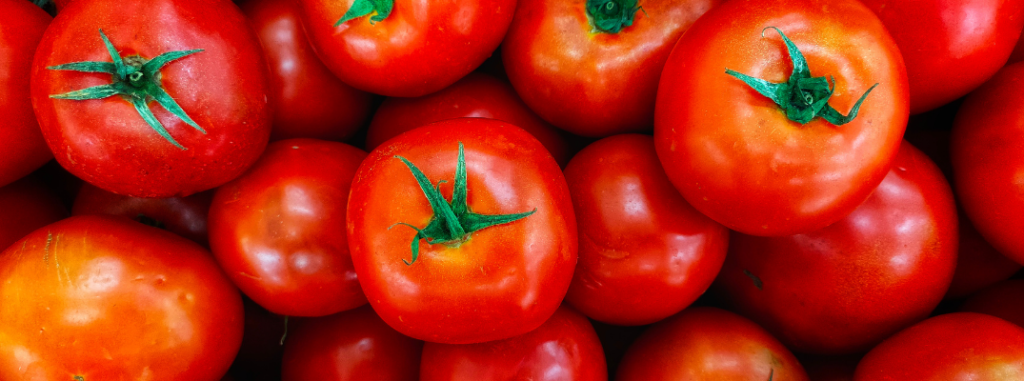Have you ever gone to a wedding reception just because you wanted party Jollof, or stared longingly at a pot of stew as it is being made? If you have, then you are one of the millions of Nigerians who love good food and who cannot survive without tomatoes.
Nigeria is a country of tomato lovers, we use it as the base of almost all our sauces, stews, and of course Jollof rice. I think it would be safe to say that we could very well have a full out crisis if we could no longer get our precious tomato fix.
It is then very surprising and absolutely mind-boggling that the post-harvest loss of tomatoes is usually above 40% in a Nation that demands over 2.4 million metric tonnes of fresh tomatoes and imports an estimated 150,000 metric tonnes of tomato concentrate annually. Recently in an appeal to the government, the national chairman of tomatoes growers association of Nigeria (TOGAN), Abdullahi Ringin said “members have lost N10bn due to poor market and lack of guaranteed off-takers. The open market cannot mop all the harvest”. Nigeria produces about 1.5 million metric tonnes of tomatoes but the post-harvest loss, and wastage accounts for about 40% of those tomatoes. This works out to be a loss of about N72bn annually.
The Federal Government has a policy on the importation of tomato paste/powder, it was meant to discourage the importation of such products by increasing the tariff by 50% with an additional levy of $1500 per metric tonne. However, this has not been the case. Farmers have made complaints that the pastes/concentrates and powder are being snuck into the country from Benin. Although the government had good intentions with the tomato importation policy, I doubt that such restrictions will ever solve the problem.
If we are to solve the food wastage problem and achieve food security in Nigeria, then we must address certain Problems.
- Uncompetitive Environment/Infrastructure: there are too many structural impediments in Nigerian agriculture. They have riddled our agribusinesses with problems and make us uncompetitive on the global scale. For instance, it takes a truck of tomatoes 6-8 days on average to get from Jibiya, Katsina state to Lagos. If these tomatoes were refrigerated they would stand a chance, but unfortunately, they aren’t, and a majority of it will be rotten on arrival in Lagos. Other impediments include; inadequate power supply, poor roads, overcrowded ports, poorly managed irrigation systems and finally an unreliable and unnecessary bureaucracy. If things are to improve then we must address these issues, public-private partnerships will be necessary to achieve this, as the government alone seems incapable of this.
- Inputs: Farmers in Nigeria still lack access to quality inputs. They lack access to the best seed varieties, fertilizers and tools such as tractors and crop sprayers. The lack of fertilizer is, however, the biggest problem for most farmers in the country. The government has tried various schemes to improve access, but despite all their effort distribution is still very uneven, and smallholder farmers are often left behind.
- Access to Markets: Many farmers in rural parts of Nigeria lack access to markets. Most of their communities are farming communities in which everyone farms the same crops, they, therefore, need to sell outside of these communities but unfortunately, this tends to be a problem. The issue is further compounded by the lack of storage facilities and guaranteed off-takers. The head of a US Social Enterprise working in Nigeria aptly observed, “when it comes to food, Nigeria doesn’t have a production problem, it has a processing problem”. Large processing factories like that of Dangote are not operating at full capacity, and most smallholders have no means of processing or preserving their products. Hence why post-harvest losses are extremely high.
- Access to credit: I think the quickest way to make a Nigerian banker wary of you is to tell them you own a small agribusiness and you are in need of credit. This is despite efforts by the government and CBN to promote agricultural lending. The banks see agriculture in Nigeria as extremely risky and not worth the trouble. This has been made worse by our land rights policy in Nigeria. Many smallholder farmers do not own the land they operate on, and besides the land, they own in rural parts of the country is of little value to the bankers.
If all these persist, then the largest recorded wastage will continue. However, if they can be addressed the gains from the tomato sector could be very large. If we can become self-sufficient in tomato production then we can save the $170 billion spent on the importation of tomatoes annually and use it for more productive ventures. We can also become a net exporter of tomatoes, both fresh and concentrate.
So next time you enjoy your rice and stew, or your really good party Jollof, remember that the tomatoes used to cook it was most likely imported or smuggled into the country. We should be doing more for our tomato farmers in the country. A great man once said, “You must be the change you want to see in the world”.

